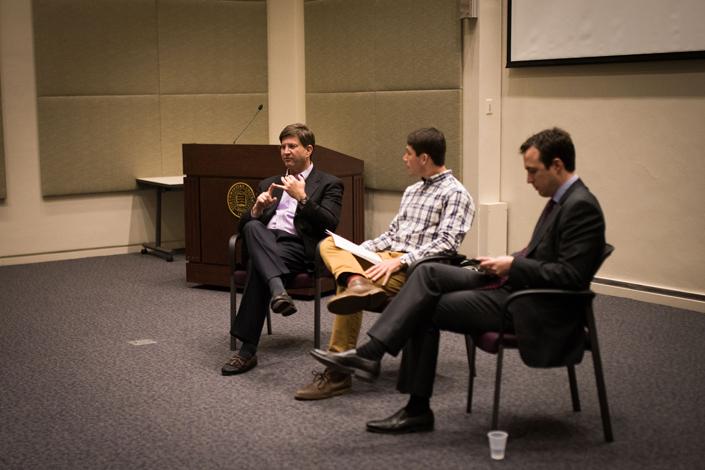Democratic congressional candidate, Republican lobbyist urge bipartisan support for Israel
Daniel Tian/The Daily Northwestern
Weinberg junior Jonathan Kamel moderates a conversation between former Rep. Brad Schneider and Republican Jewish Coalition Midwest coordinator Jeremy Wynes. Schneider and Wynes discussed U.S.-Israel relations and the pending Iran nuclear deal, advocating strong bipartisan support of Israel.
May 20, 2015
A Democratic candidate for U.S. Congress and the Midwest coordinator for the Republican Jewish Coalition both emphasized the continued importance of bipartisan support of Israel during an annual leadership dinner held in the Rebecca Crown Center on Tuesday night.
Former Rep. Brad Schneider (McCormick ’83, Kellogg ’88) and Republican Jeremy Wynes spoke about challenges and opportunities facing the U.S.-Israeli relationship, including the Iran nuclear deal and political polarization in Congress. Both said partisan disagreements over details should not be allowed to detract from bipartisan support of Israel.
Weinberg junior Jonathan Kamel opened the event by reading a letter from Chicago Mayor Rahm Emanuel (Communication ’85), who could not attend. Kamel, former president of Wildcats for Israel, said Emanuel thanked the dinner’s sponsors and had “deep appreciation” for the bipartisan support of U.S.-Israeli ties.
Schneider, who is running for his old seat in Illinois’ 10th Congressional district, echoed Emanuel’s praise for the dinner, which was co-sponsored by Wildcats for Israel, Northwestern College Democrats and NU College Republicans. Schneider also noted student efforts in light of recent tensions at NU and on college campuses across the U.S. about Israel and Palestine.
Coalition for Peace, a student group, campaigned against a resolution Associated Student Government passed in February calling for the University to divest from corporations the resolution’s authors say violate Palestinians’ human rights.
He applauded Coalition for Peace’s efforts in the divestment debate.
“If there’s a message I hope we can give tonight … don’t give up, you’re on the right side and we’ve got your back as well,” Schneider said. “We know you’re on the front lines.”
Schneider and Wynes said lack of accountability from the Palestinian leadership constitutes a major problem in the Israeli-Palestinian conflict. Though they did not agree on all points, both said any possibility for peace requires strong U.S. support of Israel.
Schneider and Wynes also identified accountability as the main problem with the Iran nuclear deal. Both said the framework for a nuclear deal in its current form places too much trust in the Iranian government and removes sanctions that would hold Iran to the agreement. However, Wynes also said the nuclear deal is representative of a broader failure of U.S. leadership.
“We’ve watched the Middle East deteriorate over the last six years, where we no longer are liked and we have no credibility even from some of our former allies. It’s dire, in my opinion,” Wynes said.
Kamel said the annual dinner, which is in its fourth year, aims to show how both sides of the aisle can come together in support of the pro-Israel community. He also said this year’s dinner was more impactful considering the topic’s presence on campus and on students’ minds.
“Especially for students who felt marginalized by the vote, I think this is an opportunity to hear — especially from Congressman Schneider who went to Northwestern and was in ASG — to hear his perspectives on (the push for divestment) and how we can face it on campus,” said Kamel, a former Daily staffer.
Medill freshman David Gernon, who attended the event, said although he may have disagreed with certain things said by Schneider and Wynes, he appreciated the dinner’s goal of bipartisan support.
“You could tell it was a gathering of people who had a lot of respect for each other, and even if they didn’t agree on all or even many of the issues, they could come together for something internationally important like this,” he said.
Email: [email protected]
Twitter: @dagerber












